Baby guinea pig sleeping habits can seem puzzling to many pet owners. Observing your little furry friend with its eyes open while snoozing might raise some concerns.
In truth, guinea pigs often sleep with their eyes partially open, a trait inherited from their wild ancestors to stay alert for predators.
This behavior can be intriguing, as the baby guinea pig may seem to be resting.
Owners can identify sleep by looking for relaxed body posture and slow breathing.
Understanding these sleep patterns can help you better care for and connect with your pet.
Ensuring your baby guinea pig has a comfortable and safe environment is key to its well-being.
The blog post will explain these sleeping habits and offer guidance on creating the ideal setting for a restful nap.
Get ready to dig into fascinating insights about your pet’s sleep behaviors.
Understanding Baby Guinea Pig Sleeping Behavior
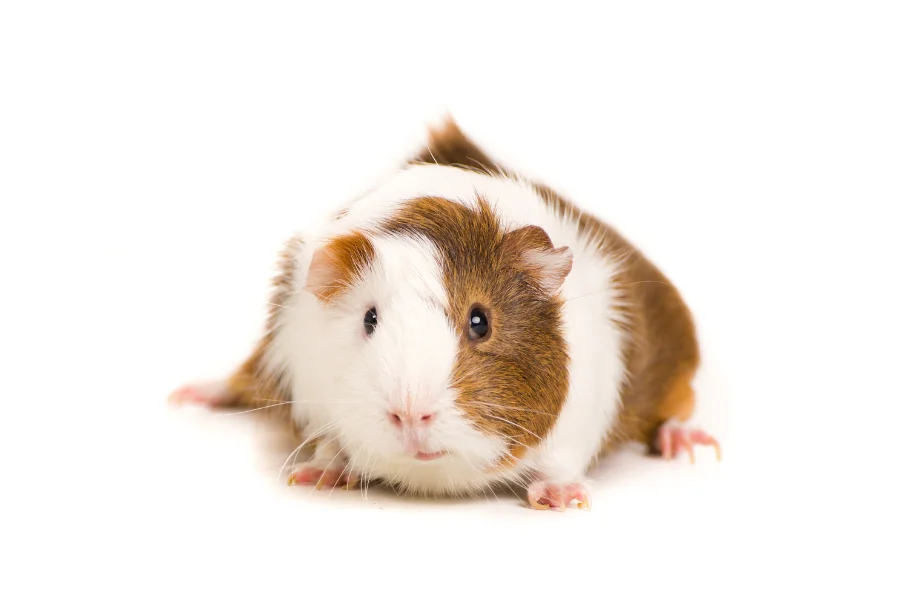
Guinea pigs sleep in unique ways, reflecting their nature as prey animals. These small pets have specific patterns and signs that signal when they’re asleep.
Sleep Patterns of Guinea Pigs
Guinea pigs, especially young guinea pigs, have distinct sleep patterns. They are known for taking short power naps throughout the day rather than long rest periods.
This behavior is a survival instinct, as these furry friends are prey animals that must remain alert.
In the wild, guinea pigs might sleep briefly to avoid potential predators. Pet guinea pigs follow a similar routine, even in safe environments.
Guinea pigs’ sleep schedule includes numerous short naps, which ensure they get enough sleep without lowering their guard. Guinea pig owners often notice these brief naps throughout the day.
Signs of Sleep in Guinea Pigs
Recognizing when a guinea pig is asleep can be tricky. Unlike other small animals, Guinea pigs rarely close their eyes while sleeping.
This odd sleeping habit helps them keep a watchful eye on their surroundings.
A gentle, rhythmic movement and relaxed posture are indicators that a guinea pig is having a comfortable snooze.
During these short naps, guinea pigs may appear alert but are indeed resting.
A secure and quiet hiding place is essential for quality sleep. Providing enough space, like a well-arranged guinea pig cage, enhances their sense of security.
Eye movement and minimal activity suggest a baby guinea pig is catching some needed rest.
Do Guinea Pigs Sleep with Their Eyes Open?
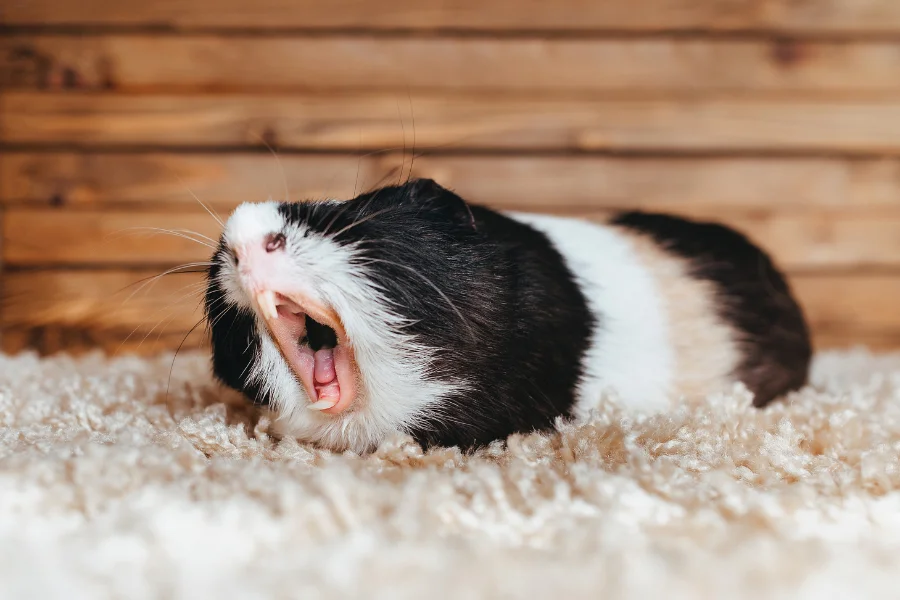
Guinea pigs sometimes give the impression they are sleeping with their eyes open, catching the curiosity of many guinea pig owners. These little pets have adapted in unique ways due to their natural behaviors.
Reasons for Sleeping with Eyes Open
A good reason why guinea pigs might appear to sleep with their eyes open is their status as prey animals. This odd sleeping habit in the wild helps them stay alert to potential predators.
Just weeks of age, baby guinea pigs might also develop a sense of security this way.
Wild guinea pigs and even those in captivity exhibit natural instincts to remain cautious.
Furry friends like pet guinea pigs may not necessarily benefit from a closed-eye nap, especially in an unsafe environment.
They often take short power naps, which allow them to respond quickly to any disturbances in their surroundings.
Evolutionary Adaptations
Natural adaptations in guinea pigs have shaped their unique sleeping habits. As small animals originating from South America, they developed certain traits to improve their chances of survival.
These adaptations play a role in their daily life today.
For guinea pig owners, it is clear that providing a comfortable snooze setup is crucial.
A cozy hiding place or pet bed can provide the safety and security for quality sleep.
Observing their sleep cycles and ensuring a consistent bedtime routine can help them get enough rest.
Such conditions encourage them to transition from their evolutionary methods to habits more suited for domestic life.
How to Observe Guinea Pig Sleep
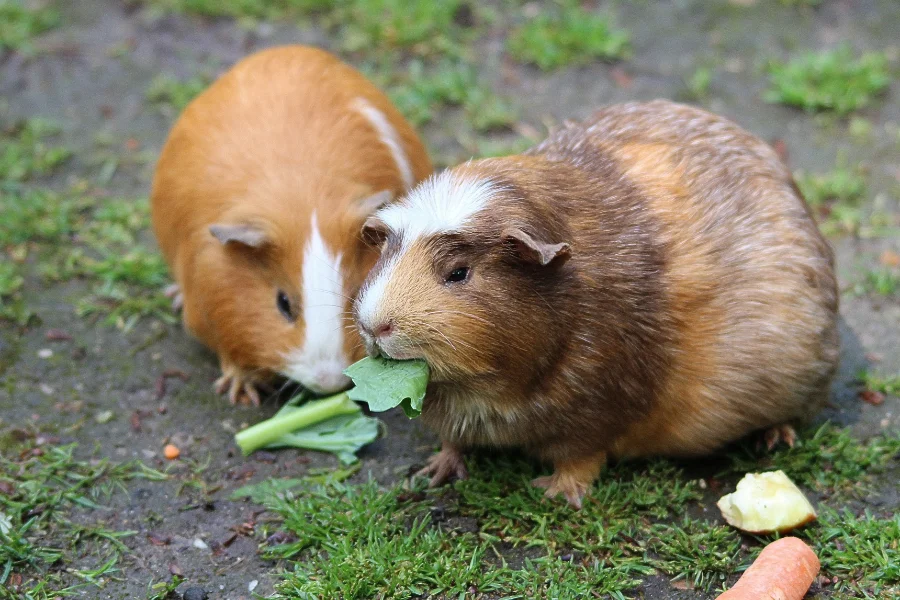
Guinea pig sleep can be unique, especially for owners new to these small pets. Observing their sleep can help them understand their behavior and ensure their health.
Optimal Observation Techniques
To observe guinea pigs sleep, keep a watchful eye on their daily life and habits.
Baby guinea pigs, like adults, often take short power naps throughout the day.
Watch for signs such as curling up, lowering their heads, or cuddling alongside other guinea pigs to determine whether they are resting comfortably.
Using a consistent routine is a good idea.
Monitor their sleep schedule to ensure that they have enough rest.
Place their bedding in a quiet, comfortable location to promote a sense of security.
Wild guinea pigs are prey animals, often sleeping with their eyes partially open. Therefore, they should be monitored for gentle breathing and relaxation, which indicate sleep.
Interpreting Guinea Pig Behavior
Understanding whether guinea pigs are resting is essential for their well-being.
They might sleep with their eyes open due to their natural instincts to remain alert to potential predators.
Guinea pig owners should notice behaviors like relaxation and shorter movements to know they are sleeping.
For social creatures like guinea pigs, having enough space in their cage encourages natural behaviors like creating a little hideout.
It’s crucial to have various bedding materials that allow them to feel comfortable and secure during their rest.
Offering them enough space and hiding places ensures a peaceful sleeping environment, similar to their wild habitats.
Ensuring a Comfortable Sleep Environment for Guinea Pigs
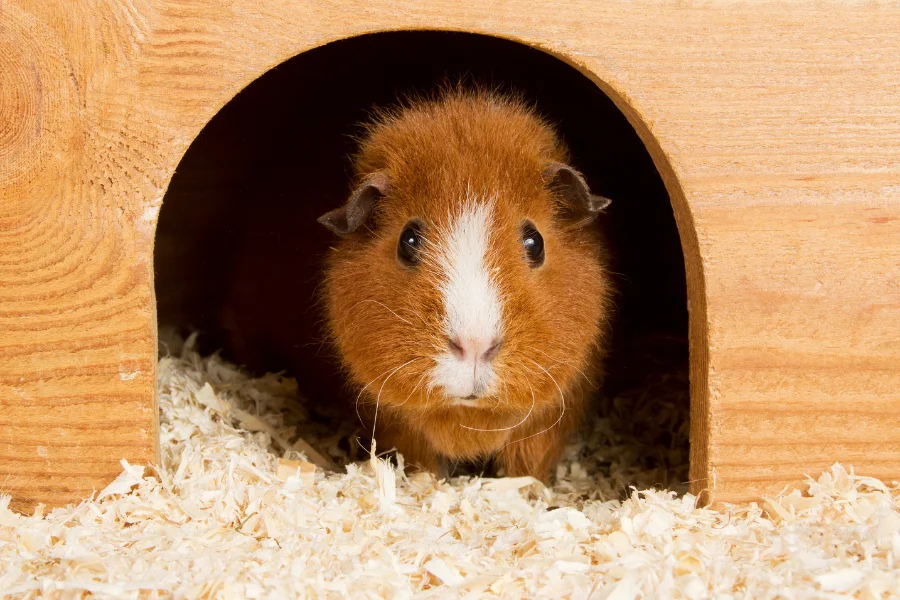
Baby guinea pigs need specific conditions to achieve a good night’s sleep. Key factors include the setup of their habitat and environmental influences that affect sleep quality and safety.
Habitat Setup
A proper guinea pig cage should be spacious enough, offering at least 7.5 square feet for one or two guinea pigs. This allows them to move freely and have their comfortable snooze areas.
It’s a good idea to include places like little hideouts to help guinea pigs feel secure from potential predators. Guinea pigs are prey animals.
Use soft bedding material, such as fleece, which is gentle on their feet and promotes warmth.
Ensure constant access to fresh water and solid food to maintain their health and happiness.
Providing social creatures like guinea pigs with the right bedding material supports their sense of security.
Environmental Factors Affecting Sleep
Avoid placing guinea pig enclosures in direct sunlight, as too much heat can cause health problems.
Instead, choose a location that offers shade and regulates temperature effectively. This will help maintain their sleep routine and prevent discomfort.
Guinea pigs, being active animals, might engage in short power naps throughout the day.
Maintaining a quiet environment with minimal disturbances is crucial to ensure quality sleep.
A proper balance of light and darkness is essential to mimic the natural day-night cycle and accommodate their natural instincts for sleep.
Health Implications of Sleep Behavior
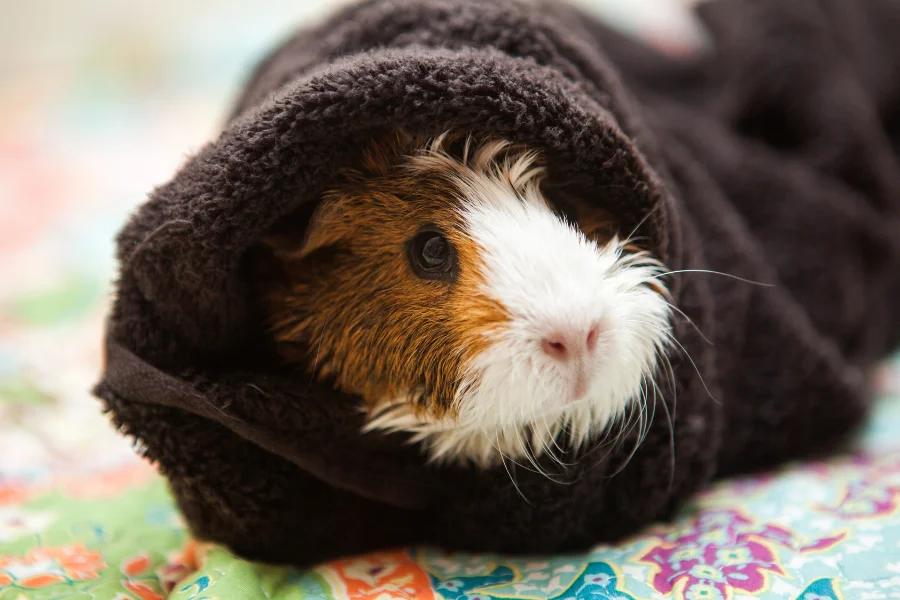
Baby guinea pigs have unique sleeping habits that vary based on their environment and individual characteristics. Understanding these behaviors is crucial for ensuring their well-being and identifying potential sleep-related health concerns.
Common Sleep Disorders
In guinea pigs, sleep disorders are not frequently observed but can affect their health and well-being.
Sleep apnea, which is more common in older guinea pigs, can also affect young ones. It can disrupt rest and lead to drowsiness.
Pet guinea pigs sometimes show irregular sleep patterns due to stress or discomfort.
Stress factors like changes in their cage or loud noises can cause them to have shorter naps.
Sleep deprivation can lead to mood changes and a weakened immune system.
To ensure enough rest, providing a safe hiding place and a consistent routine can help manage these issues.
When to Consult a Veterinarian
Guinea pig owners should monitor their furry friends for any unusual sleep patterns.
If a guinea pig appears lethargic or doesn’t wake for solid food, it could indicate a problem.
Observing any changes in the sleep schedule, especially if they coincide with signs of illness or stress, is important.
Consulting a veterinarian is a good idea if there are concerns about the animal’s sleep behavior or health.
Professionals can identify conditions that may need medical attention and suggest appropriate interventions.
Ensuring comfortable bedding in a quiet environment may further support better sleep and overall health for these social creatures.
Final Thoughts
Baby guinea pigs sleeping with their eyes open is quite common. They often rest with their eyes partially open due to their instinct to stay alert. This behavior can give the impression that they are awake, even when resting peacefully.
Guinea pigs are light sleepers and may wake up quickly at slight noises or movements.
Their sleep patterns are unique, consisting of short intervals. You’ll notice that they don’t usually sleep for long periods like humans. Instead, they take multiple naps throughout the day and night.
It’s essential to observe the overall behavior of the baby guinea pig.
As long as the guinea pig is active when awake and shows no signs of distress, an owner shouldn’t worry too much about its sleeping habits. It is usual for guinea pigs to sleep with their eyes open.
Baby guinea pigs require a safe and comfortable environment to ensure quality rest.
Providing a quiet space can help them feel secure. Ensuring they have enough hiding spots and soft bedding can make a big difference.
Proper care and attention can ensure happy and healthy guinea pigs. Learning about their behavior, such as sleeping habits, can help us better understand them.
Frequently Asked Questions
Baby guinea pigs often exhibit unique sleep behaviors that can intrigue owners. Understanding their sleep habits, such as eye movements and body postures, can provide insights into their well-being.
Do guinea pigs typically sleep with their eyes open or closed?
Guinea pigs often sleep with their eyes open, which can create the illusion that they are awake. This behavior helps them stay alert to their surroundings even while resting.
Can you recognize the different sleep states of a guinea pig by their eye movements?
Yes, observing the eyes can help. Sometimes, the eyes partially close during deeper sleep, while they might remain fully open during lighter sleep.
What are the indicative postures of a sleeping guinea pig?
A relaxed position or lying on their side often signifies a guinea pig is asleep. Stretching your legs can be another sign of comfort while sleeping.
How can you discern if a guinea pig is resting or deep asleep?
Deep sleep is often accompanied by the guinea pig not responding to light noises. In contrast, a merely resting guinea pig will be more alert and react to disturbances quickly.
What behaviors suggest that a guinea pig is experiencing quality sleep?
Steady breathing and a calm demeanor indicate quality sleep. A guinea pig in quality sleep will generally appear undisturbed by light household noises.
How do guinea pigs’ sleeping patterns change with age?
Young guinea pigs, just like human babies, tend to sleep more frequently. As they age, their sleeping patterns become more structured and less frequent.




